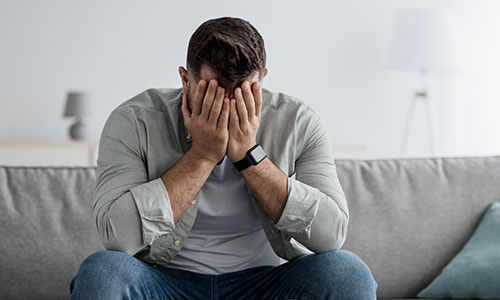5 Celebrities Who Struggled With Anxiety
6th June 2021
Anxiety is one of the most common mental health disorders worldwide, affecting a significant number of people every year. Yet, still, it remains one of the most misunderstood conditions and one the most ignored. You might have experienced some of the associated symptoms of anxiety only to brush them off. Maybe because you just thought you were going through a rough patch or didn’t want to take time away from what you were doing. But when we neglect our mental health, it can create a snowball effect. One minute, you’re fine and the next you’ve become a person you no longer recognise
Here are 10 lesser-known symptoms of anxiety you may have been ignoring:
-
Past Emotional Trauma
We’re all the product of our experiences. And if you’re someone that’s had to deal with any kind of abusive or confrontational situations in the past, unless you’ve brought closure to them through either therapy or self-healing, it’s fairly likely that they’re still affecting you in the present. It doesn’t matter whether it was prolonged trauma or a one-time event. Anything that has caused you psychological distress in the past could be affecting your ability to function and lead to social anxiety and the want to withdraw from others.
-
You Talk Yourself Down (Negative Self Talk)
This stems from a poor lack of self-esteem which can often be a knock-on effect of experiencing abuse, whether it was mental, emotional or physical. It can lead you to question yourself at every turn. There’ll be this little voice inside your head that parades as the voice of reason, but in actuality, is talking you down at every opportunity you have to do something positive for yourself. If you’ve ever caught yourself saying things like, ‘I could never do that,’ or ‘ I’m not good enough.’ Or ‘I don’t deserve that…’ It’s the negative programming that’s rooted in your old patterns of abuse that says you’re not good enough. But you are good enough. You’re always good enough.
-
You Avoid Face to Face Conversations
We all like to have our alone time. And a large portion of the population identifies as natural introverts. But there’s a difference between being an introvert and making a conscious effort to avoid people. And so, all that to say, you shouldn’t use your introversion to try and justify your anxiety. If you find yourself getting nervous when talking to people face-to-face, even if you’ve known them for years, if you struggling to maintain eye contact, you’re talking overly fast or can’t get your words out, it’s a sure sign that you may be experiencing social anxiety.
-
Lifestyle Choices (Drinking, Drugs, & Diet)
The 3 D’s can wreak havoc on your health. If you’re someone who’s always partying and not putting the right stuff into your body, eventually you’re going to experience a breakdown. Your body needs fuel, and if all you’re putting into it are toxic substances followed up by poor food choices, you’re going to suffer the consequences. Basically, you want to avoid anything that’s factory produced in industrial quantities and has more ingredients than your entire shopping list combined. Aim for whole foods and plenty of water. Alcohol is a known depressant and recreational drugs speak for themselves.
-
Changes in Social Activities
One of the biggest outward-facing effects anxiety has is on your friendships. And so that often means anytime you’re expected to fulfil your social obligations like work, school, or socialising, it can become a real struggle. It might be slow at first. You might drop out of a few meetings here and there or take a day off school. But over time, you might start to normalise this behaviour. And if things continue to escalate where you’re constantly avoiding your regular social activities, isolating yourself and making up increasing poor excuses not to venture outside, you may need to re-evaluate why it is you’re rooted in that pattern.
-
Physical Changes and Symptoms
Otherwise known as psychosomatic symptoms of anxiety. The mind-body connection can offer some deep insight into where you’re at with your mental health. It’s not uncommon for physical issues to appear alongside symptoms of anxiety.
These could be anything from:
- Chronic headaches and migraines
- Gut Issues
- Unexplained aches and pains
- Chronic Fatigue-like symptoms
- Phantom Illnesses (Not feeling well with no real cause)
- Changes in eating habits
Now, obviously, if you skip a meal one day or experience a minor headache, it’s not a red flag. But if these issues are frequent and intense, it could be a symptom of anxiety.
-
Poor Performance at Work or School
This may come as no surprise but remember, if you’re in the early stages of developing anxiety, you may be rationalising your behaviour and not be aware of it. If you’ve made avoiding face-to-face contact a habit, that will have an immediate effect on your attendance either at work or school. And you can be as good as you want either in the professional or scholastic sense. But if you’re unable to show up, you won’t be able to perform to the best of your ability. But not only that, the intensity of emotion that you’re feeling can also be a huge distraction, which could lead to:
- A drop in your grades/quality of work
- An inability to communicate and articulate your needs and ideas
- Frequently missed deadlines and assignments
- Feeling overwhelmed by your regular workload
- Intense procrastination that prevents you from focusing
-
Sleep Disturbances
Irregular sleep patterns are something that many people tend to write off. So many of us have conditioned ourselves to de-value sleep. But it’s a vital component of our overall mental health. And if you’re not getting the adequate amount of good quality sleep each night where you can enter into deep theta and delta states, the effects will eventually start showing up in your life. Sleep is one of those variables that can be both a cause and symptom of anxiety. It can be an early onset sign, but also worsen your condition if it’s not managed properly. If you start noticing any of the following red flags such as:
- Difficulty falling asleep
- Difficulty staying asleep
- Recurring Nightmares
- Not feeling refreshed after sleep
Then you should probably look at what other areas of your life match up with any of the other symptoms of anxiety we’ve talked about.
-
You’re Indecisive
We can all have trouble making decisions. But this refers to the inability to make even the simplest of choices for fear of getting it wrong. It can feel like you’ve got the weight of the world resting on your shoulders. Have you ever starred at two nearly identical products for what seems like an eternity? Have you taken weeks to make a decision going back and forth about an online purchase? There are just a few instances in which your indecisiveness can manifest. But most often, it comes down to perfectionist tendencies, the fear of failure and having a complete lack of trust in yourself.
-
You’re Constantly Over Analysing Interactions (Past, Present and Future)
Anxiety is a condition that’s said to be rooted in the future. One in which you’re always second-guessing and catastrophising about what might happen in a near-constant role-play. And it can and does manifest as something close to that. But it can also see you overthinking just about every interaction you engage in. It can just as easily make you recoil with horror every time you feel like you put a word wrong in conversation, and then continually replay it afterwards, imagining how awful the other person must think you are for something as trivial as mispronouncing a word, correcting yourself, or god-forbid if they correct you. This is an extreme state of heightened self-awareness. And while it can definitely be a good thing to develop a strong sense of personal accountability, if it comes at the expense of your mental health, it’s most definitely not worth the price you pay in return.
















